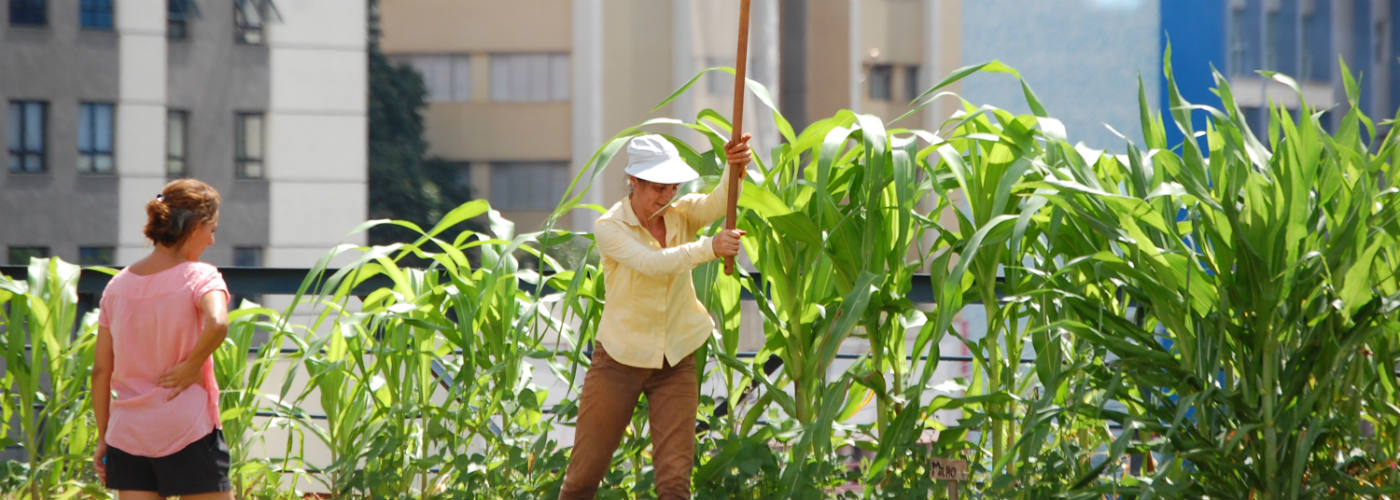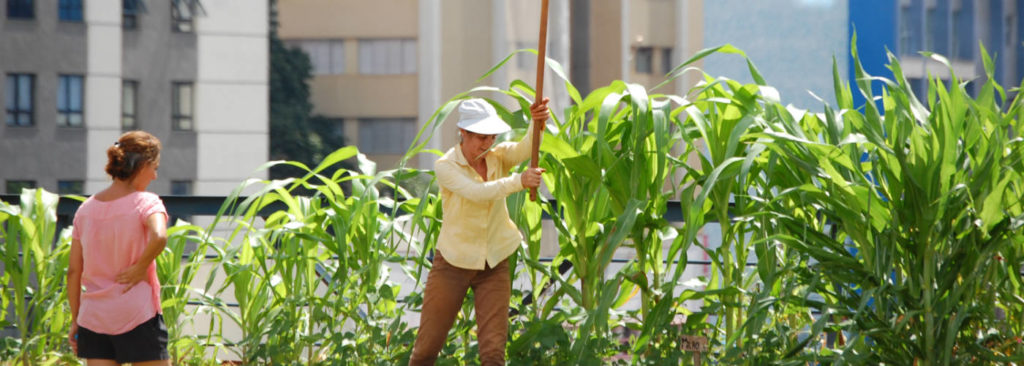While the climate crisis poses a serious threat to global food security, the way we produce our food increases the pace and severity of climate change. But the consequences of these mutually reinforcing processes will be felt disproportionately by those least responsible for causing the problem: the urban poor.
The RUAF Global Partnership on Sustainable Urban Agriculture and Food Systems works with cities around the world to reduce urban poverty and strengthen food security. Our partnership amplifies the voices of those most impacted by climate change while addressing the mounting challenges of the climate crisis.
A circular firing squad
The latest report released by the Intergovernmental Panel on Climate Change (IPCC) makes for devastating reading. Higher temperatures, changing precipitation patterns, and extreme weather events are impacting food systems and increasing the risk of supply chain disruption. This has grave repercussions on the quantity, quality and price of food, which in turn impacts food insecurity and malnutrition. Climate shocks and stresses disproportionately affect the urban poor and vulnerable groups, limiting their access to affordable, safe, and nutritious food, and reducing opportunities for them to make a living.
Climate shocks disproportionately affect the urban poor and vulnerable groups.
At the same time, the way we produce, process, distribute and consume food aggravates climate change and puts increased pressure on environmental resources. The global industrialized food system accounts for one third of all greenhouse gas (GHG) emissions. It is responsible for 80% of deforestation and 70% of terrestrial biodiversity loss. Currently one-third of the food produced is lost or wasted, which is not only dreadful in itself but also contributes to environmental degradation. Rotting food in landfill emits noxious GHG and toxic leaches contaminate ground water.
The role of cities and city regions
Rapid urbanization and the growing global population represent additional challenges to the already strained interconnection between climate and food. Studies show that 80% of all food is expected to be consumed in cities by 2050, but the ability of peri-urban and nearby rural areas to meet a significant proportion of cities’ food needs is under threat. Urban expansion in peri-urban areas sacrifices prime agricultural land for development. Moreover, in many places farmers are becoming fewer and older, as many young people migrate to cities in search of better paying, less manual jobs. Many end up in informal settlements.
The current globalized and highly industrialized food system that serves cities no longer supports our future.
For RUAF, addressing these challenges will take systemic change. Aligned with Hivos’ goal to put justice, equity and human rights at the core of global climate action, RUAF believes there is an urgent need to transform food systems to make them more just, inclusive, safe, sustainable and resilient. The current globalized and highly industrialized food system that serves cities no longer supports our future. As Jeffrey Sachs of Columbia University’s Center for Sustainable Development said at the UN Food Systems Pre-Summit, “We have a global food system, but we need a different system.”
About RUAF
The RUAF Global Partnership on Urban Agriculture and Food Systems works to transform urban agriculture and food systems in cities around the world by reducing urban poverty, enhancing urban food security, and improving urban environmental management.
RUAF is a consortium of expert institutions and individuals that includes cities, research institutes and NGOs, with a recognized track record in urban and peri-urban agriculture and urban food system solutions. The partnership is a platform for learning and knowledge brokering between science, policy and practice. It is supported by the RUAF Secretariat, which is hosted by Hivos.
Towards COP26
RUAF has collaborated with Nourish Scotland and other partners to ensure urban and city region food systems receive priority attention at the November 2021 COP26 in Glasgow, Scotland.
RUAF is a partner in the Glasgow Food and Climate Declaration, an initiative led by Nourish Scotland and IPES-Food to secure commitment of subnational governments to tackle the climate emergency through integrated food policies and to call on national governments to take parallel action. The official presentation of the Glasgow Food and Climate Declaration is scheduled to be held at the Glasgow City Chambers on the COP26 Nature Day on November 6, 2021.
On November 3, RUAF and Rikolto will co-host a session entitled, ‘Resilience in practice: how cities are tackling climate change through inclusive food actions’ as part of the Recipes for Resilience event organized by Nourish Scotland in the COP26 Food and Climate Zone. Consisting of numerous sessions, it aims to build awareness of the complex relationships of food, climate, nature and communities. The event will connect stakeholders and drive home the message that only by thinking of food as a whole system can we develop coherent policies that will deliver the resilience needed in our food systems.
During the lead-up to COP26, RUAF has participated in Local Fork to Farm Dialogues across four continents and with more than 20 communities. The initiative aims to stimulate cooperation between local governments and food producers, who rarely get a seat at the table and have been excluded from decision-making. It culminates in the Global Fork to Farm Dialogues’ at the COP26, which brings together 100 local government representatives with 100 practicing farmers at COP26 to discuss how to strengthen local food policies and the resilience of local communities.
Read more about RUAF’s recent and on-going work:
City Region Food Systems Assessment and Planning Process: forthcoming manual and online toolkit
The FAO-RUAF City Region Food Systems (CRFS) program fosters the development of sustainable and resilient food systems by strengthening rural-urban linkages. Following the first phase of the program from 2015 to 2018, the second phase (with the support of the CGIAR Water Land and Ecosystems (WLE) program, hosted by the International Water Management Institute) focuses on building resilience to climate shocks and stresses and to pandemics. The CRFS approach has been piloted in a total of 11 cities. Informed by their experiences, in late 2021 RUAF and FAO will publish a new, comprehensive manual to enable cities to conduct their own CRFS assessment and action planning process. The manual will be accompanied by a revised online toolkit containing practical tools, workshop activities, training units, and technical examples.
Milan Urban Food Policy Pact Monitoring Framework Handbook and Resource Pack
The Milan Urban Food Policy Pact (MUFPP) Monitoring Framework Handbook and Resource Pack provides practical guidance for any city wishing to adopt and implement the Pact’s monitoring framework, tailored to their own context. Developed by RUAF, FAO and MUFPP Secretariat, and supported by WLE, the handbook sets out practical steps, simple tools, and top tips for cities to select, adapt or devise indicators to measure progress of their own priorities. Designed “for cities by cities,” this resource is based on the lessons learned from three pilot cities – Antananarivo (Madagascar), Nairobi (Kenya) and Quito (Ecuador).
The handbook and resource pack were formally launched in a well-attended session entitled ‘Tools for food systems transformation’ at the 7th MUFPP Global Summit in Barcelona in October 2021. At the session, connections and complementarities were established with the Barcelona Challenge on Good Food and Climate, an initiative by the city of Barcelona, MUFPP and C40 for cities and their residents to commit to transforming their food systems to tackle the climate emergency.


